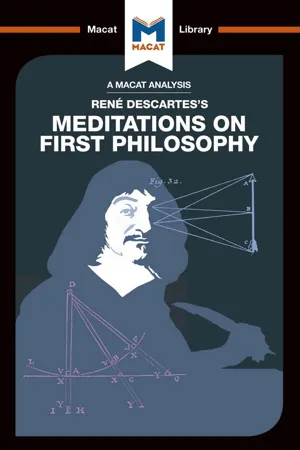
- 102 pages
- English
- ePUB (mobile friendly)
- Available on iOS & Android
An Analysis of Rene Descartes's Meditations on First Philosophy
About this book
René Descartes's 1641 Meditations on First Philosophy is a cornerstone of the history of western thought. One of the most important philosophical texts ever written, it is also a masterclass in the art of critical thinking – specifically when it comes to reasoning and interpretation.
Descartes sought to do nothing less than create a new foundation for the pursuit of knowledge – whether philosophical, scientific, or theological. To that end, he laid out a systematic programme that reinterpreted prior definitions of knowledge, and reasoned out a systematic means of obtaining, verifying, and building on existing human knowledge. To this end, Descartes created a definition of true knowledge as that which is based on things which cannot be called into doubt by radical scepticism. If, he suggests, we can find a belief that cannot be called into doubt, this will provide a solid foundation upon which we can build systematic reasoning. This 'cartesian' method, as it has come to be known, is a blueprint for reasoning that continues to shape the study of philosophy today: a careful weighing of possibilities, searching out solid ground and building on it step by step.
Frequently asked questions
- Essential is ideal for learners and professionals who enjoy exploring a wide range of subjects. Access the Essential Library with 800,000+ trusted titles and best-sellers across business, personal growth, and the humanities. Includes unlimited reading time and Standard Read Aloud voice.
- Complete: Perfect for advanced learners and researchers needing full, unrestricted access. Unlock 1.4M+ books across hundreds of subjects, including academic and specialized titles. The Complete Plan also includes advanced features like Premium Read Aloud and Research Assistant.
Please note we cannot support devices running on iOS 13 and Android 7 or earlier. Learn more about using the app.
Information
Table of contents
- Cover
- Title Page
- Copyright Page
- Table of Contents
- Ways in to the Text
- Section 1: Influences
- Section 2: Ideas
- Section 3: Impact
- Glossary of Terms
- People Mentioned in the Text
- Works Cited